The day they shot my five friends
After receiving threats for banning hunting on her land, a British woman in Spain found her dogs killed
This is one of those tales that make you angry. So if you are at all sensitive to the gory details of animal cruelty, stop reading. It is the story of Illona Mitchell, a 48-year-old British woman who moved with her then husband in 2004 to the south of Spain – more specifically to Caniles in Granada, a village of 4,300 people.
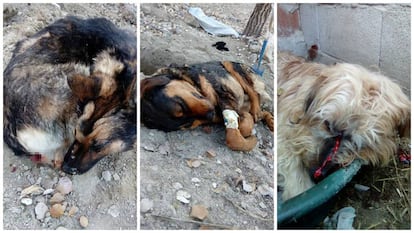
After a lot of work, the couple managed to buy a beautiful 173-hectare (427-acre) farm, five kilometers out of Caniles. The area was both lively and beautiful, with native forests of pine, holm oak and juniper populated by hares, deer, foxes and wild boar.
The only thing I want is to be left in peace and see justice done Illona Mitchell
Illona has always been an animal and nature lover. In fact, she brought her two horses with her from the United Kingdom. So, with her new set up, it seemed life couldn’t get any better. Like many Brits coming to the peninsula, she was seeking peace but instead she came face to face with the dark side of rural Spain. On January 6 – or King's Day, when children in Spain traditionally receive their Christmas presents – five of her dogs were shot, the sixth disappeared and one of her horses was beaten about the head so violently that it could lose its eye.
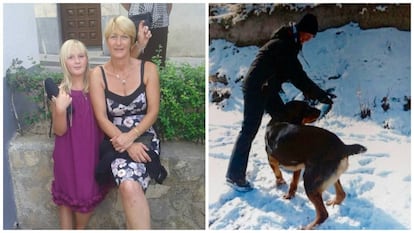
Over the 13 years she has been in Spain, Illona has had her share of good and bad times. Her daughter Eli was born here 11 years ago. After a long fight with Spanish bureaucracy, she managed to get permission to build a home on her land. The clarification of land boundaries brought her into conflict with some of her neighbors, she and her husband separated, she fell in love again and, most importantly, she did what she has always dreamed of doing – she set up an animal rescue shelter.
Gradually, her animal family grew until there were 10 dogs, five cats and 14 horses to look after. This she did with the help of her friend Mandy and Mandy’s husband Roberto, a British couple who live on a farm nearby. As time went on, and after some serious deliberation, she decided to fence off her land to prevent people hunting on it. This, she believes, is the reason her animals have been killed – as a brutal act of revenge.
“Ever since I decided there would be no hunting here, there have been all kinds of insults thrown my way,” she says. “I’ve been stopped on the street, my daughter and I have been intimidated and my signature has even been forged on official documents, making hunting on my land legal.”
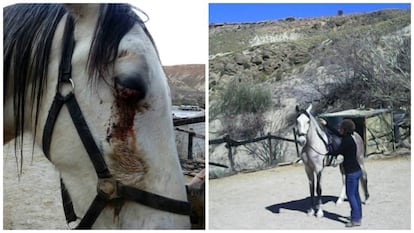
Illona is still in a state of shock and has lost nine kilos since her dogs were killed and her horse attacked. She still doesn’t know how to explain what happened to her daughter, a girl who loves animals as much as she does – if not more. “They waited until it was a holiday, such as King’s Day, because that’s when there are fewer police about and security is lower. It was all planned,” she says.
Real hunters don’t do things like that: we condemn these acts as criminal Jairo Azar, Granada hunting federation
Illona and Eli are not the only ones who are distraught. Illona’s friend Mandy and her husband found the dogs first. As Illona still lives in town – her house will be finished next month – Mandy and Roberto would generally be the ones to feed the animals in the morning. Illona would get there a little later and stay until evening. On the day of the slaughter, Eli was still busy opening her presents when Illona got the call. The dogs were dead, said Mandy, who has since been on medication to calm her nerves. She has also put the couple’s property on sale, frightened that there might be a repeat performance.
Illona left immediately and found a nightmarish scene awaiting her. The kennels where the dogs slept had been opened during the night. “And because they were very sociable dogs by nature, they must have come out to say hello because almost all their bodies were outside their kennels,” says Isidoro, Illona’s partner.
Dizzy, a shy seven-year-old mongrel, was the only one to be killed where he slept. “He must have stayed inside the kennel because he doesn’t like to go near strangers. He finds it difficult to trust people because he was badly treated, but he was a lovely dog,” says Isidoro, 40, who farms locally.
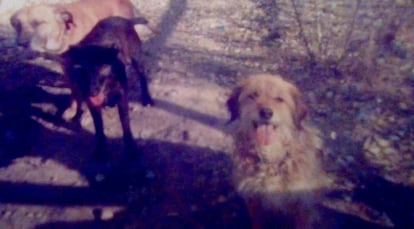
Coco the dog, aged two, and Maisie, a two-month-old puppy, each got a bullet in the head and lay in a pool of blood at the door to their kennels. Jack, a German shepherd, had been shot in the mouth. He survived for half an hour but died on the way to the vet. Domingo, three, was shot in the face and lasted until the next morning. Rocky, two, is still missing while the four other dogs were lucky enough to escape. They were found days later.
Roco, the four-year-old colt, was beaten repeatedly over the head. This caused so much damage to his eye that the vet is not sure he can save it. “Horses are very noble and affectionate animals,” says Isidoro who is also convinced that the killings were a premeditated act of revenge by hunters who refused to stay off Illona’s land. “Roco was great but now he’s a mess. If he hears a male voice, he starts to tremble. At first, he would only let Illona and Mandy near him. But now he won’t even accept them. He’s very nervous. He and I had a special bond because I spent a lot of time with him but now he can’t stand me. Or the vet. So it’s really hard to treat him. He needs time.”
Jairo Azar, director of education with Granada’s hunting federation, calls the acts “savage” and “horrible.” According to him, “real hunters don’t do things like that. We condemn these acts as criminal, as we did in the case of the hunter who killed two forest rangers in Catalonia,” he says, referring to a recent case in the north of Spain.
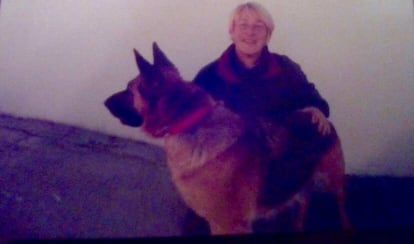
Azar adds that everyone has the right to ban hunting on private property and the ban must be respected. “Being a hunter means obeying the law and what has happened here clearly isn’t [legal]. I don’t know what went on because it’s not something we knew anything about. It could have been a personal grudge or perhaps something carried out by poachers. We don’t do things like that. This is someone who is clearly disturbed,” he says.
Roco, a four-year-old colt, was beaten repeatedly over the head and may lose his eye
Disturbed or not, the person or people who attacked Illona’s dogs and horse knew what they were doing. They were cool and collected enough to pick up the cartridges and cover their tracks. The only evidence Seprona, the Civil Guard’s environmental department, has managed to obtain is a .22 caliber bullet lodged in the skull of one of the dogs: the animal was shot with what appears to have been a short-barreled rifle. They have since interviewed a number of people but are still investigating.
“We are sure that they won’t give up until they find the culprits,” says Isidoro. “They’ve told us that in cases like these, you have to examine the immediate surroundings. At least we’ve been lucky enough to get agents on the case who love animals and who are horrified by what happened.”

In 2016, Seprona intervened in more than 12,400 cases of animal abuse in Spain, 783 of which resulted in penalties being applied. However, only 490 people were detained or investigated.
Meanwhile, Illona is terrified. She doesn’t trust anyone and she has taken the other dogs to her house in town to protect them. Until the perpetrators are found, she doesn’t want to rescue any more animals, although she is clear about one thing: she will maintain the hunting ban on her land. She has also offered a reward to anyone who offers information. “They were all so good,” she says, referring to the dogs. “They had suffered a lot of abuse before, but here they were looked after and were doing well. It’s so unfair. The only thing I want is to be left in peace and see justice done.”
This article originally appeared on the AnimalesyCía blog.
English version by Heather Galloway.
Tu suscripción se está usando en otro dispositivo
¿Quieres añadir otro usuario a tu suscripción?
Si continúas leyendo en este dispositivo, no se podrá leer en el otro.
FlechaTu suscripción se está usando en otro dispositivo y solo puedes acceder a EL PAÍS desde un dispositivo a la vez.
Si quieres compartir tu cuenta, cambia tu suscripción a la modalidad Premium, así podrás añadir otro usuario. Cada uno accederá con su propia cuenta de email, lo que os permitirá personalizar vuestra experiencia en EL PAÍS.
¿Tienes una suscripción de empresa? Accede aquí para contratar más cuentas.
En el caso de no saber quién está usando tu cuenta, te recomendamos cambiar tu contraseña aquí.
Si decides continuar compartiendo tu cuenta, este mensaje se mostrará en tu dispositivo y en el de la otra persona que está usando tu cuenta de forma indefinida, afectando a tu experiencia de lectura. Puedes consultar aquí los términos y condiciones de la suscripción digital.









































